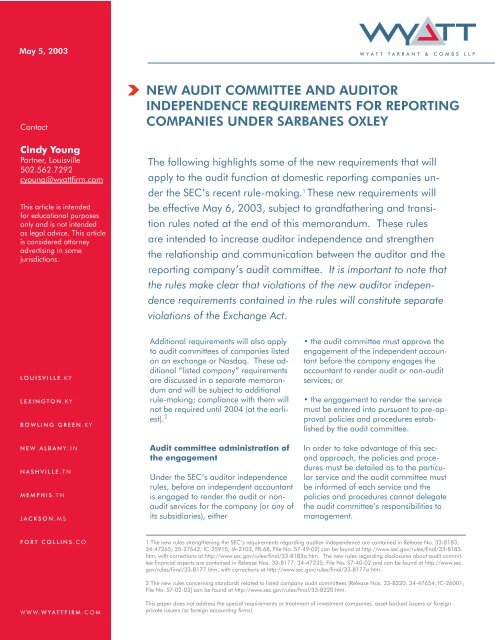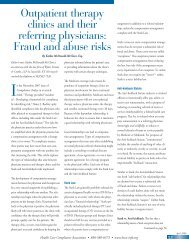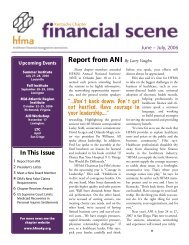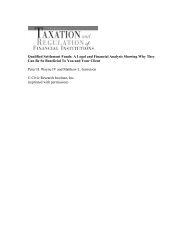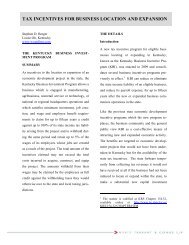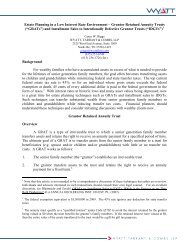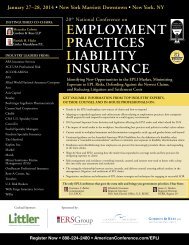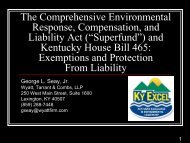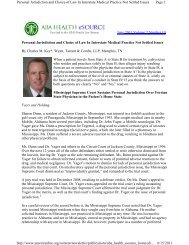new audit committee and auditor independence requirements for ...
new audit committee and auditor independence requirements for ...
new audit committee and auditor independence requirements for ...
You also want an ePaper? Increase the reach of your titles
YUMPU automatically turns print PDFs into web optimized ePapers that Google loves.
May 5, 2003<br />
Contact<br />
Cindy Young<br />
Partner, Louisville<br />
502.562.7292<br />
cyoung@wyattfirm.com<br />
This article is intended<br />
<strong>for</strong> educational purposes<br />
only <strong>and</strong> is not intended<br />
as legal advice. This article<br />
is considered attorney<br />
advertising in some<br />
jurisdictions.<br />
New <strong>audit</strong> <strong>committee</strong> <strong>and</strong> <strong>audit</strong>or<br />
<strong>independence</strong> <strong>requirements</strong> <strong>for</strong> reporting<br />
companies under Sarbanes Oxley<br />
The following highlights some of the <strong>new</strong> <strong>requirements</strong> that will<br />
apply to the <strong>audit</strong> function at domestic reporting companies under<br />
the SEC’s recent rule-making. 1 These <strong>new</strong> <strong>requirements</strong> will<br />
be effective May 6, 2003, subject to gr<strong>and</strong>fathering <strong>and</strong> transition<br />
rules noted at the end of this memor<strong>and</strong>um. These rules<br />
are intended to increase <strong>audit</strong>or <strong>independence</strong> <strong>and</strong> strengthen<br />
the relationship <strong>and</strong> communication between the <strong>audit</strong>or <strong>and</strong> the<br />
reporting company’s <strong>audit</strong> <strong>committee</strong>. It is important to note that<br />
the rules make clear that violations of the <strong>new</strong> <strong>audit</strong>or <strong>independence</strong><br />
<strong>requirements</strong> contained in the rules will constitute separate<br />
violations of the Exchange Act.<br />
L O U I S V I L L E . K Y<br />
L E X I N G T O N . K Y<br />
B O W L I N G G R E E N . K Y<br />
Additional <strong>requirements</strong> will also apply<br />
to <strong>audit</strong> <strong>committee</strong>s of companies listed<br />
on an exchange or Nasdaq. These additional<br />
“listed company” <strong>requirements</strong><br />
are discussed in a separate memor<strong>and</strong>um<br />
<strong>and</strong> will be subject to additional<br />
rule-making; compliance with them will<br />
not be required until 2004 (at the earliest).<br />
2<br />
• the <strong>audit</strong> <strong>committee</strong> must approve the<br />
engagement of the independent accountant<br />
be<strong>for</strong>e the company engages the<br />
accountant to render <strong>audit</strong> or non-<strong>audit</strong><br />
services; or<br />
• the engagement to render the service<br />
must be entered into pursuant to pre-approval<br />
policies <strong>and</strong> procedures established<br />
by the <strong>audit</strong> <strong>committee</strong>.<br />
N E W A L B A N Y . I N<br />
N A S H V I L L E . T N<br />
M E M P H I S . T N<br />
J A C K S O N . M S<br />
Audit <strong>committee</strong> administration of<br />
the engagement<br />
Under the SEC’s <strong>audit</strong>or <strong>independence</strong><br />
rules, be<strong>for</strong>e an independent accountant<br />
is engaged to render the <strong>audit</strong> or non<strong>audit</strong><br />
services <strong>for</strong> the company (or any of<br />
its subsidiaries), either<br />
In order to take advantage of this second<br />
approach, the policies <strong>and</strong> procedures<br />
must be detailed as to the particular<br />
service <strong>and</strong> the <strong>audit</strong> <strong>committee</strong> must<br />
be in<strong>for</strong>med of each service <strong>and</strong> the<br />
policies <strong>and</strong> procedures cannot delegate<br />
the <strong>audit</strong> <strong>committee</strong>’s responsibilities to<br />
management.<br />
F O R T C O L L I N S . C O<br />
1 The <strong>new</strong> rules strengthening the SEC’s <strong>requirements</strong> regarding <strong>audit</strong>or <strong>independence</strong> are contained in Release No. 33-8183;<br />
34-47265; 35-27642; IC-25915; IA-2103, FR-68, File No. S7-49-02] can be found at http://www.sec.gov/rules/final/33-8183.<br />
htm, with corrections at http://www.sec.gov/rules/final/33-8183a.htm. The <strong>new</strong> rules regarding disclosures about <strong>audit</strong> <strong>committee</strong><br />
financial experts are contained in Release Nos. 33-8177; 34-47235; File No. S7-40-02 <strong>and</strong> can be found at http://www.sec.<br />
gov/rules/final/33-8177.htm, with corrections at http://www.sec.gov/rules/final/33-8177a.htm.<br />
2 The <strong>new</strong> rules concerning st<strong>and</strong>ards related to listed company <strong>audit</strong> <strong>committee</strong>s [Release Nos. 33-8220; 34-47654; IC-26001;<br />
File No. S7-02-03] can be found at http://www.sec.gov/rules/final/33-8220.htm.<br />
W W W. W Y A T T F I R M . C O M<br />
This paper does not address the special <strong>requirements</strong> or treatment of investment companies, asset-backed issuers or <strong>for</strong>eign<br />
private issuers (or <strong>for</strong>eign accounting firms).
Failure to comply with this pre-approval requirement<br />
will mean that the accountant is not independent (<strong>and</strong><br />
cannot serve as the company’s <strong>audit</strong>or), subject to one<br />
exception: The pre-approval requirement is waived <strong>for</strong><br />
the provision of services other than <strong>audit</strong>, review or attest<br />
services if:<br />
• the aggregate amount of all such services provided<br />
constitutes no more than 5% of the total amount of revenues<br />
paid by the company to its accountant during the<br />
fiscal year in which the services are provided;<br />
• such services were not recognized by the company at<br />
the time of the engagement to be non-<strong>audit</strong> services;<br />
<strong>and</strong><br />
• such services are promptly brought to the attention of<br />
the <strong>audit</strong> <strong>committee</strong> of the company <strong>and</strong> approved prior<br />
to the completion of the <strong>audit</strong> by the <strong>audit</strong> <strong>committee</strong> or<br />
by one or more members of the <strong>audit</strong> <strong>committee</strong> who<br />
are members of the board of directors to whom authority<br />
to grant such approvals has been delegated by the<br />
<strong>audit</strong> <strong>committee</strong>.<br />
Note: Policies <strong>and</strong> procedures adopted by the <strong>audit</strong><br />
<strong>committee</strong>s <strong>for</strong> approval of services will have to be<br />
disclosed in the company’s proxy statement <strong>and</strong> annual<br />
report filed with the SEC.<br />
Additional note: There are some non-<strong>audit</strong> services that<br />
an independent accountant cannot provide, regardless<br />
of <strong>audit</strong> <strong>committee</strong> approval. These are described in<br />
further detail below.<br />
Auditor’s communication with <strong>audit</strong> <strong>committee</strong>s<br />
The company’s <strong>audit</strong>or is required to report to the <strong>audit</strong><br />
<strong>committee</strong>, prior to the filing of the <strong>audit</strong> report with the<br />
SEC:<br />
• all critical accounting policies <strong>and</strong> practices to be<br />
used;<br />
• all alternative treatments within GAAP <strong>for</strong> policies <strong>and</strong><br />
practices related to material items that have been discussed<br />
with management of the company, including:<br />
• ramifications of the use of such<br />
alternative disclosures <strong>and</strong> treatments; <strong>and</strong><br />
• the treatment preferred by the <strong>audit</strong>or; <strong>and</strong><br />
• other material written communications between the<br />
registered public accounting firm <strong>and</strong> the management<br />
of the company, such as any management letter or<br />
schedule of unadjusted differences;<br />
Note: These items should be added to the agenda <strong>for</strong><br />
the <strong>audit</strong> <strong>committee</strong> meeting that occurs prior to the filing<br />
of the Form 10-K.<br />
Additional note: The SEC instructs reporting company<br />
<strong>audit</strong> <strong>committee</strong>s <strong>and</strong> their <strong>audit</strong>ors to refer to the<br />
guidance it provided in its December 2001 Cautionary<br />
Advice Regarding Disclosure About Critical Accounting<br />
Policies to determine the types of matters that should be<br />
communicated to the <strong>audit</strong> <strong>committee</strong>. This guidance is<br />
available at http://www.sec.gov/rules/other/33-8040.<br />
htm.<br />
Annual report disclosures about the <strong>audit</strong><br />
<strong>committee</strong>’s financial expertise<br />
The SEC rules do not impose any financial expertise requirement<br />
on <strong>audit</strong> <strong>committee</strong> members. However, they<br />
will require disclosures about <strong>audit</strong> <strong>committee</strong> financial<br />
expertise in annual reports on Form 10-K <strong>for</strong> fiscal years<br />
ending on or after July 15, 2003 (or, <strong>for</strong> small business<br />
issuers, on Form 10-KSB <strong>for</strong> fiscal years ending on or<br />
after December 15, 2003). A company will be required<br />
to disclose in its annual report whether the board of<br />
directors has determined that the company either:<br />
• has at least one <strong>audit</strong> <strong>committee</strong> financial expert serving<br />
on its <strong>audit</strong> <strong>committee</strong>; or<br />
• does not have an <strong>audit</strong> <strong>committee</strong> financial expert<br />
serving on its <strong>audit</strong> <strong>committee</strong>.<br />
If the board has determined that an <strong>audit</strong> <strong>committee</strong><br />
financial expert serves on the <strong>audit</strong> <strong>committee</strong>, the annual<br />
report must disclose the name of the <strong>audit</strong> <strong>committee</strong><br />
financial expert <strong>and</strong> whether that person is independent.<br />
Only one <strong>audit</strong> <strong>committee</strong> financial expert must<br />
be identified as such, but if the company chooses to<br />
disclose the identity of more than one financial expert, it<br />
must indicate whether such persons are independent.<br />
If the board has determined that no <strong>audit</strong> <strong>committee</strong><br />
financial expert is serving on the <strong>audit</strong> <strong>committee</strong>, the<br />
annual report must explain why the company does not<br />
have an <strong>audit</strong> <strong>committee</strong> financial expert.<br />
An “<strong>audit</strong> <strong>committee</strong> financial expert” means a person<br />
who has the following attributes:<br />
W Y A T T T A R R A N T & C O M B S L L P
• an underst<strong>and</strong>ing of generally accepted accounting<br />
principles <strong>and</strong> financial statements;<br />
• the ability to assess the general application of such<br />
principles in connection with the accounting <strong>for</strong> estimates,<br />
accruals <strong>and</strong> reserves;<br />
• experience preparing, <strong>audit</strong>ing, analyzing or evaluating<br />
financial statements that present a breadth <strong>and</strong><br />
level of complexity of accounting issues that are generally<br />
comparable to the breadth <strong>and</strong> complexity of issues<br />
that can reasonably be expected to be raised by the<br />
company’s financial statements, or experience actively<br />
supervising one or more persons engaged in such<br />
activities;<br />
• an underst<strong>and</strong>ing of internal controls <strong>and</strong> procedures<br />
<strong>for</strong> financial reporting; <strong>and</strong><br />
• an underst<strong>and</strong>ing of <strong>audit</strong> <strong>committee</strong> functions;<br />
<strong>and</strong> who acquired such attributes through:<br />
• education <strong>and</strong> experience as a principal financial<br />
officer, principal accounting officer, controller, public accountant<br />
or <strong>audit</strong>or or experience in one or more positions<br />
that involve the per<strong>for</strong>mance of similar functions;<br />
• experience actively supervising a principal financial<br />
officer, principal accounting officer, controller, public<br />
accountant, <strong>audit</strong>or or person per<strong>for</strong>ming similar functions;<br />
• experience overseeing or assessing the per<strong>for</strong>mance<br />
of companies or public accountants with respect to the<br />
preparation, <strong>audit</strong>ing or evaluation of financial statements;<br />
or<br />
• other relevant experience.<br />
If a person qualifies as an <strong>audit</strong> <strong>committee</strong> financial expert<br />
based on “other relevant experience,” a brief listing<br />
of that person's relevant experience will be required.<br />
The SEC rules provide a safe harbor to make clear<br />
that the designation of a person as an <strong>audit</strong> <strong>committee</strong><br />
financial expert does not make that person an “expert”<br />
<strong>and</strong> does not change any duties, obligations or liability<br />
that are greater than the duties, obligations <strong>and</strong> liability<br />
imposed on any member (including the designated person)<br />
of the <strong>audit</strong> <strong>committee</strong> or the board of directors.<br />
The disclosure about the existence of an <strong>audit</strong> <strong>committee</strong><br />
financial expert is not required to be included a<br />
proxy or in<strong>for</strong>mation statement (although, like other disclosures<br />
in Part III of the annual report, a company may<br />
elect to include the in<strong>for</strong>mation in the proxy statement<br />
<strong>and</strong> incorporate it by reference into the annual report).<br />
Proxy statement <strong>and</strong> annual report disclosures<br />
about the <strong>audit</strong>or relationship<br />
Proxy statements are required to disclose the aggregate<br />
fees billed <strong>for</strong> each of the last two fiscal years <strong>for</strong> professional<br />
services rendered by the principal accountant<br />
<strong>for</strong> the reporting company<br />
• under the caption Audit Fees, <strong>for</strong> the <strong>audit</strong> of the<br />
company’s annual financial statements <strong>and</strong> review of financial<br />
statements included in the company’s quarterly<br />
SEC reports or services that are normally provided by<br />
the accountant in connection with statutory <strong>and</strong> regulatory<br />
filings or engagements <strong>for</strong> those fiscal years.<br />
• under the caption Audit-Related Fees, <strong>for</strong> assurance<br />
<strong>and</strong> related services that are reasonably related to the<br />
per<strong>for</strong>mance of the <strong>audit</strong> or review of the company’s<br />
financial statements <strong>and</strong> are not reported as Audit Fees.<br />
The company must describe the nature of the services<br />
comprising the fees disclosed under this category.<br />
• under the caption Tax Fees, <strong>for</strong> professional services<br />
<strong>for</strong> tax compliance, tax advice, <strong>and</strong> tax planning. The<br />
company must describe the nature of the services comprising<br />
the fees disclosed under this category.<br />
• under the caption All Other Fees, <strong>for</strong> products <strong>and</strong><br />
services provided, other than the services reported as<br />
Audit or Audit-Related Fees. The company is required to<br />
describe the nature of the services comprising the fees<br />
disclosed under this category.<br />
The proxy statement is also required to disclose<br />
• the <strong>audit</strong> <strong>committee</strong>'s pre-approval policies <strong>and</strong><br />
procedures <strong>for</strong> the provision of <strong>audit</strong> <strong>and</strong> non-<strong>audit</strong><br />
services by the company’s <strong>audit</strong>or,<br />
• the percentage of services included in the Audit Fees,<br />
Audit-Related Fees <strong>and</strong> All Other Fees categories that<br />
were approved by the <strong>audit</strong> <strong>committee</strong> after-the-fact<br />
pursuant to the waiver provision noted above, <strong>and</strong><br />
• if greater than 50%, the percentage of hours expended<br />
on the principal accountant’s engagement to <strong>audit</strong><br />
W Y A T T T A R R A N T & C O M B S L L P
the company’s financial statements <strong>for</strong> the most recent<br />
fiscal year that were attributed to work per<strong>for</strong>med by<br />
persons other than the principal accountant’s full-time,<br />
permanent employees.<br />
These same types of disclosures will also be required in<br />
the annual report on Form 10-K (<strong>and</strong> Form 10-KSB).<br />
Avoiding conflicts of interest -- <strong>audit</strong> partner<br />
rotation<br />
In order <strong>for</strong> an <strong>audit</strong>or to be considered independent,<br />
the <strong>audit</strong> partners must comply with the following <strong>requirements</strong>:<br />
• Generally, an <strong>audit</strong> partner cannot per<strong>for</strong>m the services<br />
of a lead partner or concurring partner <strong>for</strong> more<br />
than 5 consecutive years. After per<strong>for</strong>ming the services<br />
of a lead or concurring partner <strong>for</strong> 5 consecutive years,<br />
the <strong>audit</strong> partner must take a 5 year break be<strong>for</strong>e per<strong>for</strong>ming<br />
the services of a lead partner or a concurring<br />
partner, or a combination of those services.<br />
• Similarly, an <strong>audit</strong> partner cannot per<strong>for</strong>m one or<br />
more of the following services <strong>for</strong> more than seven<br />
consecutive years. After per<strong>for</strong>ming such services <strong>for</strong> 7<br />
consecutive years, the <strong>audit</strong> partner must take a 2 year<br />
break be<strong>for</strong>e per<strong>for</strong>ming such services again or acting<br />
as a lead or a concurring partner <strong>for</strong> the company, or a<br />
combination of those services. Services covered:<br />
• provision of more than ten hours of <strong>audit</strong>,<br />
review, or attest services in connection with the<br />
annual or interim consolidated financial<br />
statements of the company; <strong>and</strong><br />
• service as the "lead partner" in connection<br />
with any <strong>audit</strong> or review related to the<br />
annual or interim financial statements of a<br />
subsidiary of the company whose assets or<br />
revenues constitute 20% or more of the assets<br />
or revenues of the company’s respective<br />
consolidated assets or revenues.<br />
Definition. An “<strong>audit</strong> partner” is generally defined to<br />
include the lead partner <strong>and</strong> concurring partner as<br />
well as any other <strong>audit</strong> engagement team partner who<br />
provides the services described in the <strong>for</strong>egoing paragraph,<br />
but does not include a partner who consults with<br />
members of the <strong>audit</strong> engagement team on technical or<br />
industry-specific issues, transactions or events.<br />
Exception. Any accounting firm with less than five <strong>audit</strong><br />
clients that are reporting companies <strong>and</strong> less than ten<br />
partners is exempt from these years of service limits<br />
provided the Public Company Accounting Oversight<br />
Board conducts a review at least once every three years<br />
of each of the <strong>audit</strong> firm’s reporting company engagements<br />
that would result in a lack of <strong>audit</strong>or <strong>independence</strong><br />
but <strong>for</strong> this exception.<br />
No incentive compensation to <strong>audit</strong> partners <strong>for</strong><br />
cross-selling<br />
In order <strong>for</strong> an <strong>audit</strong>or to be independent, no <strong>audit</strong><br />
partner can, at any point during the <strong>audit</strong> <strong>and</strong> professional<br />
engagement period, earn or receive compensation<br />
based on the <strong>audit</strong> partner procuring engagements<br />
with the reporting company to provide any products or<br />
services other than <strong>audit</strong>, review or attest services. The<br />
same exception <strong>for</strong> small accounting firms with a limited<br />
number of reporting company clients that applies<br />
to the <strong>audit</strong> partner rotation <strong>requirements</strong> also applies<br />
to this prohibition.<br />
Limits on employment relationships<br />
The company cannot employ a <strong>for</strong>mer partner, principal,<br />
shareholder, or professional employee of the<br />
company’s <strong>audit</strong>or in an accounting role or financial<br />
reporting oversight role if the individual was a member<br />
of the company’s <strong>audit</strong> engagement team during the<br />
year preceding the date that <strong>audit</strong> procedures commenced<br />
<strong>for</strong> the fiscal period in which the company<br />
hired the individual. 3 Audit procedures are deemed<br />
commenced <strong>for</strong> a particular fiscal period on the day<br />
after the company files its Form 10-K <strong>for</strong> its prior fiscal<br />
year. This restriction is in addition to existing SEC<br />
rules that prevent a company from employing a <strong>for</strong>mer<br />
partner, principal, shareholder or professional employee<br />
of the <strong>audit</strong>or in an accounting role or a financial<br />
reporting oversight role if the individual influences the<br />
<strong>audit</strong>or’s operations or financial policies or has certain<br />
financial interests in the <strong>audit</strong>or.<br />
Employing a <strong>for</strong>mer partner, principal, shareholder or<br />
professional employee of an <strong>audit</strong>or in violation of these<br />
restrictions will render the <strong>audit</strong>or not independent.<br />
3 Certain exceptions exist <strong>for</strong> certain members of the <strong>audit</strong> engagement team, such as a member other than a “lead” or “concurring” partner who provided 10 or<br />
fewer hours of <strong>audit</strong>, review or attest services during the applicable period.<br />
W Y A T T T A R R A N T & C O M B S L L P
Prohibited non-<strong>audit</strong> services<br />
A reporting company’s <strong>audit</strong>or cannot, at any point<br />
during the <strong>audit</strong> <strong>and</strong> professional engagement period, 4<br />
provide any of the following non-<strong>audit</strong> services to the<br />
<strong>audit</strong> client:<br />
• Bookkeeping or other services related to the accounting<br />
records or financial statements of the <strong>audit</strong> client.<br />
Any service, unless it is reasonable to conclude that<br />
the results of these services will not be subject to <strong>audit</strong><br />
procedures during an <strong>audit</strong> of the <strong>audit</strong> client's financial<br />
statements, including:<br />
• maintaining or preparing the <strong>audit</strong> client's<br />
accounting records;<br />
• preparing the <strong>audit</strong> client's financial<br />
statements that are filed with the SEC or that<br />
<strong>for</strong>m the basis of financial statements filed with<br />
the SEC; or<br />
• preparing or originating source data<br />
underlying the <strong>audit</strong> client's financial<br />
statements.<br />
• Financial in<strong>for</strong>mation systems design <strong>and</strong> implementation.<br />
Any service, unless it is reasonable to conclude<br />
that the results of these services will not be subject to<br />
<strong>audit</strong> procedures during an <strong>audit</strong> of the <strong>audit</strong> client's<br />
financial statements, including:<br />
• directly or indirectly operating, or supervising<br />
the operation of, the <strong>audit</strong> client's in<strong>for</strong>mation<br />
system or managing the <strong>audit</strong> client's local area<br />
network; or<br />
• designing or implementing a hardware or<br />
software system that aggregates source data<br />
underlying the financial statements or<br />
generates in<strong>for</strong>mation that is significant to the<br />
<strong>audit</strong> client's financial statements or other<br />
financial in<strong>for</strong>mation systems taken as a whole.<br />
• Appraisal or valuation services, fairness opinions, or<br />
contribution-in-kind reports. Any appraisal service, valuation<br />
service, or any service involving a fairness opinion<br />
or contribution-in-kind report <strong>for</strong> an <strong>audit</strong> client, unless<br />
it is reasonable to conclude that the results of these services<br />
will not be subject to <strong>audit</strong> procedures during an<br />
<strong>audit</strong> of the <strong>audit</strong> client's financial statements.<br />
• Actuarial services. Any actuarially-oriented advisory<br />
service involving the determination of amounts recorded<br />
in the financial statements <strong>and</strong> related accounts <strong>for</strong> the<br />
<strong>audit</strong> client other than assisting a client in underst<strong>and</strong>ing<br />
the methods, models, assumptions, <strong>and</strong> inputs used<br />
in computing an amount, unless it is reasonable to conclude<br />
that the results of these services will not be subject<br />
to <strong>audit</strong> procedures during an <strong>audit</strong> of the <strong>audit</strong> client's<br />
financial statements.<br />
• Internal <strong>audit</strong> outsourcing services. Any internal <strong>audit</strong><br />
service that has been outsourced by the <strong>audit</strong> client that<br />
relates to the <strong>audit</strong> client's internal accounting controls,<br />
financial systems, or financial statements, <strong>for</strong> an <strong>audit</strong><br />
client unless it is reasonable to conclude that the results<br />
of these services will not be subject to <strong>audit</strong> procedures<br />
during an <strong>audit</strong> of the <strong>audit</strong> client's financial statements.<br />
• Management functions. Acting, temporarily or permanently,<br />
as a director, officer, or employee of an <strong>audit</strong><br />
client, or per<strong>for</strong>ming any decision-making, supervisory,<br />
or ongoing monitoring function <strong>for</strong> the <strong>audit</strong> client.<br />
• Human resources.<br />
• searching <strong>for</strong> or seeking out prospective<br />
c<strong>and</strong>idates <strong>for</strong> managerial, executive, or<br />
director positions;<br />
• engaging in psychological testing, or other<br />
<strong>for</strong>mal testing or evaluation programs;<br />
• undertaking reference checks of prospective<br />
c<strong>and</strong>idates <strong>for</strong> an executive or director position;<br />
• acting as a negotiator on the <strong>audit</strong> client's<br />
behalf, such as determining position, status<br />
or title, compensation, fringe benefits, or other<br />
conditions of employment; or<br />
• recommending, or advising the <strong>audit</strong> client<br />
to hire, a specific c<strong>and</strong>idate <strong>for</strong> a specific job<br />
(except that an accounting firm may, upon<br />
request by the <strong>audit</strong> client, interview c<strong>and</strong>idates<br />
<strong>and</strong> advise the <strong>audit</strong> client on the c<strong>and</strong>idate's<br />
competence <strong>for</strong> financial accounting,<br />
administrative, or control positions).<br />
• Broker-dealer, investment adviser, or investment<br />
banking services. Acting as a broker-dealer (registered<br />
or unregistered), promoter, or underwriter, on behalf of<br />
4 “Audit <strong>and</strong> professional engagement period” includes both the period covered by the financial statements being <strong>audit</strong>ed or reviewed <strong>and</strong> the period of engagement<br />
to <strong>audit</strong> or review the client’s financial statements or to prepare a report filed with the Commission. The period of engagement begins when the <strong>audit</strong>or signs<br />
an initial engagement letter or begins <strong>audit</strong>, review or attest procedures, <strong>and</strong> ends when the client or the <strong>audit</strong>or notifies the Commission that the client is no longer<br />
the <strong>audit</strong>or’s <strong>audit</strong> client.<br />
W Y A T T T A R R A N T & C O M B S L L P
an <strong>audit</strong> client, making investment decisions on behalf<br />
of the <strong>audit</strong> client or otherwise having discretionary<br />
authority over an <strong>audit</strong> client's investments, executing a<br />
transaction to buy or sell an <strong>audit</strong> client's investment, or<br />
having custody of assets of the <strong>audit</strong> client, such as taking<br />
temporary possession of securities purchased by the<br />
<strong>audit</strong> client.<br />
• Legal services. Providing any service to an <strong>audit</strong> client<br />
that, under circumstances in which the service is provided,<br />
could be provided only by someone licensed,<br />
admitted, or otherwise qualified to practice law in the<br />
jurisdiction in which the service is provided.<br />
• Expert services unrelated to the <strong>audit</strong>. Providing an expert<br />
opinion or other expert service <strong>for</strong> an <strong>audit</strong> client, or<br />
an <strong>audit</strong> client's legal representative, <strong>for</strong> the purpose of<br />
advocating an <strong>audit</strong> client's interests in litigation or in a<br />
regulatory or administrative proceeding or investigation.<br />
In any litigation or regulatory or administrative proceeding<br />
or investigation, an accountant's <strong>independence</strong> shall<br />
not be deemed to be impaired if the accountant provides<br />
factual accounts, including in testimony, of work<br />
per<strong>for</strong>med or explains the positions taken or conclusions<br />
reached during the per<strong>for</strong>mance of any service provided<br />
by the accountant <strong>for</strong> the <strong>audit</strong> client.<br />
Note. The SEC reiterated its long-st<strong>and</strong>ing position that<br />
an <strong>audit</strong>or can generally provide tax services to its clients<br />
without impairing its <strong>independence</strong>, though the SEC<br />
cautioned that certain types of services labeled as ‘tax<br />
services’ would or could impair the <strong>audit</strong>or’s <strong>independence</strong><br />
(e.g., acting as an advocate <strong>for</strong> the client in a tax<br />
court case).<br />
Transition <strong>and</strong> gr<strong>and</strong>fathering<br />
Provided they did not impair the accountant's <strong>independence</strong><br />
under pre-existing <strong>requirements</strong>, the existence of<br />
the following relationships on May 6, 2003 will not be<br />
deemed to impair an <strong>audit</strong>or’s <strong>independence</strong>:<br />
• Employment relationships that commenced at the<br />
company to prior May 6, 2003.<br />
• Compensation earned or received, as described<br />
above <strong>for</strong> cross-selling, during the fiscal year of the accounting<br />
firm that includes May 6, 2003.<br />
• Until May 6, 2004, the provision of prohibited non<strong>audit</strong><br />
services provided those services are pursuant to<br />
contracts in existence on May 6, 2003.<br />
• Until May 6, 2003, the provision of services by the accountant<br />
that have not been pre-approved by the <strong>audit</strong><br />
<strong>committee</strong>.<br />
• Until the first day of the company’s fiscal year beginning<br />
after May 6, 2003, <strong>for</strong> services by a “lead” partner<br />
<strong>and</strong> other <strong>audit</strong> partner (other than the "concurring"<br />
partner) <strong>for</strong> a longer period of time than permitted under<br />
the <strong>new</strong> rules.<br />
• Until the first day of the company’s fiscal year beginning<br />
after May 6, 2004 <strong>for</strong> services by a “concurring”<br />
partner providing services in excess of those permitted<br />
under the <strong>new</strong> rules.<br />
For the purposes of calculating periods of<br />
maximum service:<br />
• For the lead partner <strong>and</strong> concurring partner,<br />
the period of service includes time served as the<br />
lead or concurring partner prior to May 6,<br />
2003; <strong>and</strong><br />
• For <strong>audit</strong> partners other than the lead partner<br />
or concurring partner, the period of service<br />
does not include time served on the <strong>audit</strong><br />
engagement team prior to the first day of the<br />
company’s fiscal year beginning on or after<br />
May 6, 2003.<br />
W Y A T T T A R R A N T & C O M B S L L P


